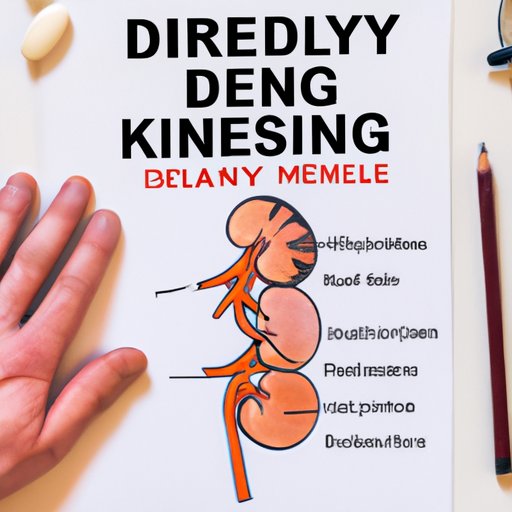
Can You Die from Kidney Disease?
When it comes to our health, it’s important to understand all potential risks and consequences. Kidney disease is a serious condition that affects millions of people worldwide. In this article, we will explore what kidney disease is, its potential consequences, and what you can do to manage and prevent it.
Understanding Kidney Disease
Our kidneys are vital organs that remove waste and excess fluids from our bodies. Kidney disease, also known as nephropathy, is a condition that occurs when our kidneys are damaged and can no longer function properly.
There are two main types of kidney disease: acute and chronic. Acute kidney disease typically occurs suddenly and can be caused by a variety of factors, such as an infection or injury. Chronic kidney disease, on the other hand, develops gradually over time and is often caused by underlying conditions such as high blood pressure or diabetes.
Chronic kidney disease can be dangerous if left untreated, as it can lead to kidney failure – a life-threatening condition in which our kidneys can no longer filter waste from our blood.
The Dangers of Overlooking Symptoms
One of the most concerning things about kidney disease is that it often goes unnoticed until it has progressed to a later stage. Some common symptoms of kidney disease include fatigue, swelling in the legs, and changes in urination habits. However, these symptoms can also be indicators of other conditions, which can make kidney disease difficult to diagnose.
The dangers of ignoring or underestimating the symptoms of kidney disease cannot be understated. Left untreated, kidney disease can lead to kidney failure, which requires dialysis or a kidney transplant to manage.
It’s crucial that you seek medical attention if you experience any of these symptoms. Early detection and management of kidney disease can help slow its progression and improve your chances of a successful treatment outcome.
Exploring Treatment Options
There are several treatment options available for kidney disease. These include medication, dialysis, and kidney transplant. The treatment you receive will depend on the stage and cause of your kidney disease, as well as other factors such as your overall health.
Medications can be prescribed to manage underlying conditions that contribute to kidney disease, such as high blood pressure or diabetes. Dialysis is a procedure that filters waste and excess fluids from your blood, replacing the function of your kidneys in the event of kidney failure. A kidney transplant involves surgically replacing a damaged kidney with a healthy one from a donor.
While each treatment option has its potential benefits and drawbacks, the ultimate goal is to manage your kidney disease and improve your quality of life. Your healthcare provider can discuss these options with you and help you make an informed decision about which treatment is best for you.
Personal Stories
Personal stories can be powerful motivators for those affected by kidney disease. Hearing about the journeys of others can help us understand the impact that this condition can have on our lives.
One such individual is John, a 48-year-old man who was diagnosed with kidney disease in his early 40s. John’s journey with kidney disease has been difficult, but he has found strength in his wife’s support and the advice of his healthcare team. John’s story can inspire readers to take their health seriously and seek medical help if they experience any concerning symptoms.
The Connection Between Lifestyle Choices and Kidney Disease
Lifestyle choices play a significant role in the development of kidney disease. Certain habits, such as smoking or consuming high amounts of alcohol, can increase our risk of developing kidney disease. Additionally, conditions such as high blood pressure or diabetes can be managed through lifestyle changes, which can also help reduce the risk of kidney disease.
Small lifestyle changes can make a big difference in managing and preventing kidney disease. Some of these changes include drinking plenty of water, eating a healthy diet rich in fruits and vegetables, and quitting smoking.
The Importance of Early Diagnosis and Management
Early detection and management are essential for successfully treating kidney disease. This condition can progress quickly, and early intervention can help slow its progression and improve your chances of a positive treatment outcome.
If you are at risk for kidney disease, it’s important to get tested regularly and seek medical attention if you experience any concerning symptoms. Additionally, managing underlying conditions such as high blood pressure or diabetes can help reduce your risk of developing kidney disease.
Conclusion
Kidney disease is a serious condition that requires prompt attention and management. By understanding the symptoms and risk factors of kidney disease, seeking medical attention early on, and making positive lifestyle changes, you can reduce your risk of developing kidney disease and improve your overall health. Don’t wait until it’s too late – take control of your kidney health today.




